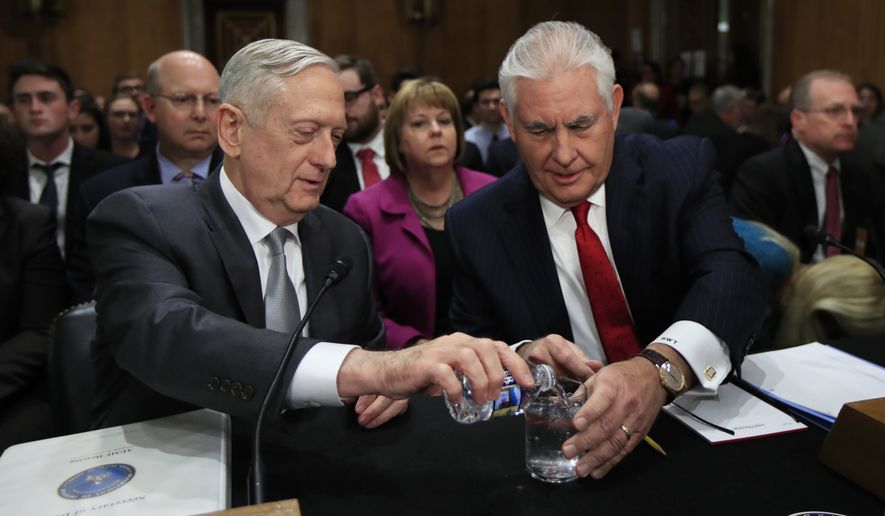The White House is pushing back against congressional efforts to redefine and, in some cases, curtail how Washington carries out combat operations against terror groups such as Islamic State, the Taliban and al Qaeda.
Defense Secretary James Mattis and Secretary of State Rex W. Tillerson took a hard line Monday, urging Congress not to implement further restrictions on how the White House deploys forces and executes operations in support of the overall U.S. counterterrorism mission.
The “war on terrorism” law passed by Congress in 2001 and expanded in 2002, known officially as the Authorization for the Use of Force (AUMF), should not be replaced by any new legislation or authorization passed by Congress, Mr. Mattis said.
“Though a statement of continued congressional support would be welcome, a new AUMF is not legally required to address the continuing threat posed by al Qaeda, the Taliban and ISIS,” Mr. Mattis said as part of his prepared opening statement to the Senate panel.
Those authorities, which paved the way for the wars in Afghanistan and Iraq, “remain a sound basis for ongoing U.S. military operations against a mutating threat,” the Pentagon chief added.
Additionally, any new war powers drafted by Senate lawmakers cannot include restrictions on where U.S. counterterrorism operations take place in the world or on the duration of those operations, Mr. Tillerson said. The Pentagon and State Department “are fully aligned on these issues,” he added during Monday’s hearing.
“This is an enemy that has changed … over the last 16 years,” and no longer fits the criteria lawmakers once used in determining when and where the U.S. takes military action, said Mr. Tillerson.
But the current combat authorities under both the 2001 and 2002 measures “have been stretched beyond all recognition,” Sen. Christopher A. Coons, Delaware Democrat, told reporters before Monday’s hearing. “Congress has ceded too much control” to the executive branch over where and when the U.S. goes to war, he said.
“Congress needs to weigh in. Our adversaries, our allies and, most importantly, our troops must know we speak with one voice,” Sen. Jeff Flake, Arizona Republican, said during Monday’s hearing.
“We [aim] to aspire to be more than just a feedback loop,” he said of the Senate’s role in determining how the U.S. exercises its military might.
The deaths of four Army Special Forces members in Niger earlier this month prompted serious questions inside the Beltway over the scale and scope of the U.S. counterterrorism mission in Africa and elsewhere across the world.
“There are legitimate questions to be raised on how informed Americans are” on how and where the White House and Pentagon are deploying American troops during counterterrorism operations, Mr. Coons said.
Staff Sgts. Bryan Black, Jeremiah Johnson and Dustin Wright and Sgt. La David Johnson were ambushed by Islamic State affiliates during a joint patrol with Niger units near the country’s border with Mali. The slain Special Forces soldiers were attached to a military training mission with Niger, a mission the Defense Department characterizes as “non-combat.”
The attack in Niger “made it clearer than ever we are in need of a new authorization” to govern American military engagements and operations against extremist groups like Islamic State, al Qaeda and the Taliban, Mr. Coons said Monday.
• Carlo Muñoz can be reached at cmunoz@washingtontimes.com.




Please read our comment policy before commenting.